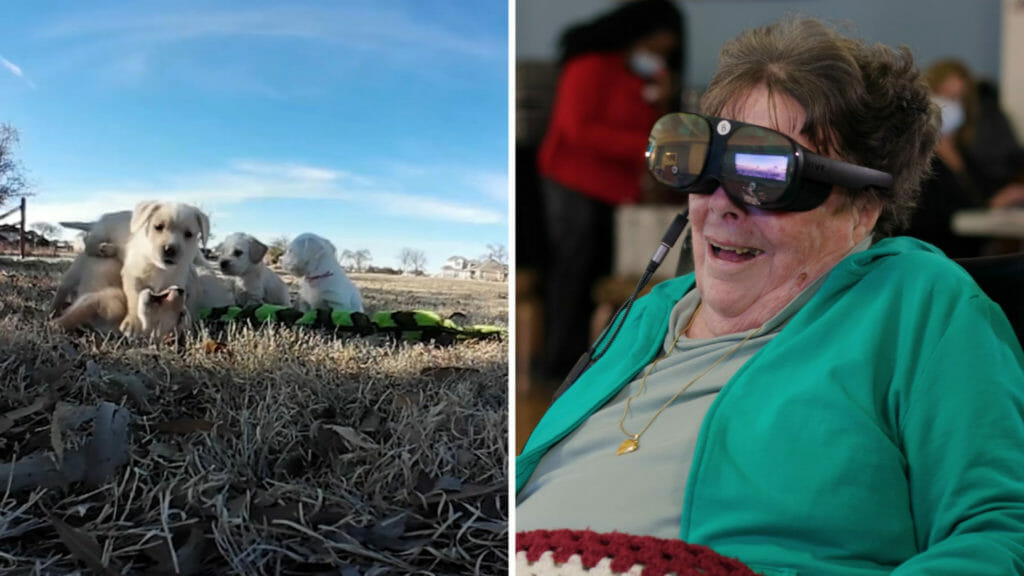
Virtual reality-based therapies are now covered by insurance for some New York long-term care residents under a new partnership with an institutional special needs plan. The offering is not available to assisted living residents yet, but coverage is planned for next year.
MyndVR, which provides VR experiences for senior living residents and other older adults, recently announced a partnership with specialty managed care organization AgeWell New York to offer VR therapy sessions to nursing home residents as part of AgeWell’s CareWell I-SNP plan. The agreement marks the first time that MyndVR is covered by insurance and comes as the company looks to expand coverage of its technology among Medicare Advantage plans and managed Medicaid plans.
Amanda Thalmann, AgeWell associate director of I-SNP and Medicare operations, told McKnight’s Senior Living that the COVID-19 pandemic led to a discussion about adding VR therapy to its added benefit of alternative therapies, which includes advanced movement, Tai chi and chair yoga.
“The main focus is isolation, anxiety and mental wellness of our members,” Thalmann said.
AgeWell is delivering MyndVR devices to five skilled nursing facilities to facilitate virtual therapy sessions among its 200 I-SNP members there, as part of its mental health and wellness offerings. Thalmann said that AgeWell is looking to branch out to assisted living communities in 2024.
Each facility where the program is active will receive three headsets and tablet computers. A nurse practitioner and social worker embedded at each facility will work with the recreation department to administer the program.
Thalmann said she knew that the program would be a success after a demonstration at one of the facilities, when she saw the response from the staff members and residents.
“It was awesome. We were all laughing,” she said. “Just seeing it actually happen was awesome. It’s definitely exciting.”
MyndVR is used in senior living and care communities across the United States, Canada and Australia as a recreational tool, but AgeWell is the first insurance company to cover it as a supplemental benefit under Medicare Advantage.
MyndVR CEO Chris Brickler told McKnight’s Senior Living that the partnership with AgeWell is a first step in beginning to meet the needs of a broader range of aging adults, not only in I-SNP plans, but across the spectrum of Medicare Advantage and eventually traditional Medicare. He said that more than 100,000 people are enrolled in I-SNP plans across the country and that there are more 5 million members across all SNPs.
“The MyndVR platform, as it exists today, is already built to help with recreational therapy, rehab and some of the most common therapeutic indications among seniors — notably sundowning/dementia, Parkinson’s, depression and isolation,” Brickler said. “Our plan is to continue to evolve the platform and add content to continually improve the clinical efficacy of virtual reality-based digital therapeutics — ultimately, with the goal of adding prescription digital therapeutics to the platform.”
Digital therapeutics promoted at federal level
The company also is looking to expand coverage of its MyndVR technology through a DigitalTherapyNOW.org coalition. The group of academic and industry partners is working to educate lawmakers to support passage of the Access to Prescription Digital Therapeutics Act, originally introduced in March 2022. The legislation, if passed, formally would recognize digital therapeutics at a federal level.
Brickler said that MyndVR is creating a distribution platform to enable caretakers to deliver prescription digital therapeutics to Medicare beneficiaries. He estimates that close to 50 million aging adults across a variety of settings — including assisted living, memory care, skilled nursing/post-acute care, veteran homes, hospitals, infusion clinics, hospice, palliative care and in homes — could benefit from MyndVR in the form of reminiscence therapy, to physical and occupational therapy, to “simply keeping their minds engaged and connected.”
“We’re well on our way to prescription digital therapeutics being adopted by more and more payers, improving accuracy of care and quality of life in senior care, as well as many other areas of healthcare,” Brickler said. “We’re very excited to see the regulatory and reimbursement systems begin to catch up with innovation taking place in the world of digital therapeutics.”




